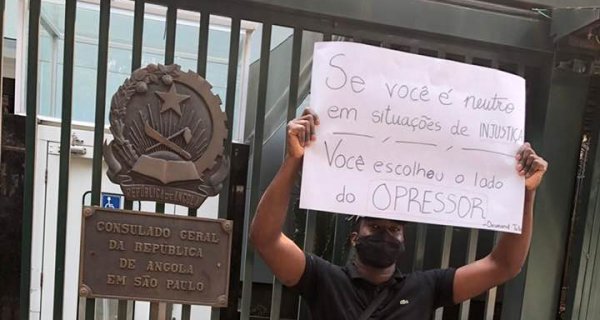Participants were dressed in black, carried posters and presented themselves as independent young people studying in Brazil and have no ties to the Angolan Government.
Aura Bianca Vasconcelos, 25, one of the promoters of the action, explained that she decided to call on friends and activists to hold the first demonstration of Angolans in Brazil after seeing other protests that took place in Angola and also in Portugal, against police violence during the pandemic.
"We want to show Angolans that they can go to the streets peacefully, they can speak out and they can appeal to their human rights that have also been violated in this pandemic period, something that has been done by police officers," explained the young woman.
Aura Bianca Vasconcelos stressed that the demonstration was called and organized through social networks, in groups on Facebook and also through the WhatsApp application, last week.
"Unfortunately, Angolans are still very afraid to speak out because of our political history, we were oppressed for many years and still are. We who are in the Diaspora are not afraid of this and even came to show our faces at the Consulate," said the young woman.
The protest started at 10 am (2 pm in Luanda) and took place in front of the Angolan Consulate, in a prime area of the city.
Standing in front of the consular building, the protesters chanted songs, paid homage, read texts and slogans, as well as a minute's silence for the victims of police brutality in Angola.
One of the protesters, 22-year-old Weza Nárcia Pinto Mingosso, said that despite living in Brazil, it is important to join the protest to give signals to Angola.
"The time is right for us to show that we are the change, we need to believe in ourselves, go to the streets and show our Government that we are not happy with what is happening in Angola," said the young woman.
Another student who joined the act was Alberto Dias, 29 years old: "The great motivation to be here is to show people, show and [make] the Government change its management and the mistakes it has made. This has been culminating with these incidents that unfortunately has taken over not only the life of our doctor, but [that of] other people who were victims of this police violence ", he explained.
The student cited the case of doctor Sílvio Dala, who died on September 1, when he was taken by police to a police station, because he was driving without a face mask in Luanda.
The death of Sílvio Dala triggered a series of protests in Angola and other countries, including Portugal.
Protesters call for an end to police violence following the many deaths associated with police action since the beginning of the covid-19 pandemic.
On the small adherence to the protest in Brazil, prosecutors downplay it. "Even if there were five, seven or ten, it would be a change, it would be something different, something that was never done here in São Paulo," said Weza Nárcia Pinto Mingosso.
"Regardless of the people who joined us or not, it is very important to bring together these [people] who are here today because it shows that we want changes. We will make a difference here from Brazil", concluded the young Angolan.







